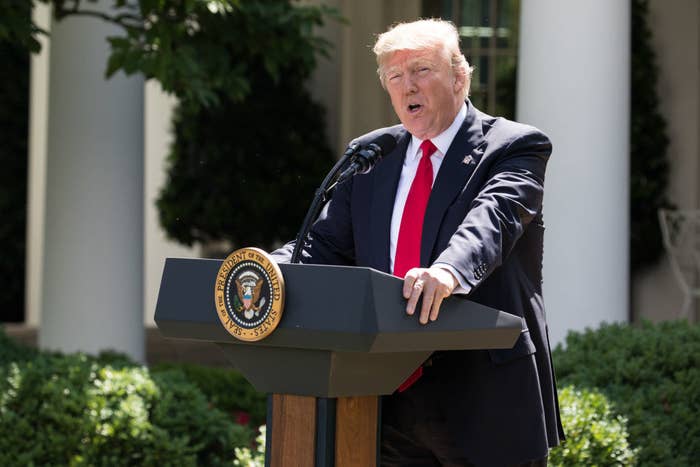
The United States formally pulled out of the Paris climate accord on Wednesday, walking away from the global agreement to try to stave off catastrophic warming in a year plagued by record-breaking climate disasters.
The long-awaited change comes the morning after a still-undecided election between President Donald Trump, a brazen climate denier, and former vice president Joe Biden, who ran on an unprecedented platform for climate action.
Of the nearly 200 countries that signed the historic agreement to keep global temperature rise this century below 2 degrees Celsius, the US, which is the largest historical emitter of climate pollution, is the only one to leave. The country’s exit from the climate agreement has been a lengthy process, coming three years after Trump first declared his intention to do so in a controversial speech at the White House Rose Garden in June 2017, and one year after the administration submitted the paperwork to make the move official.
The slow retreat, a result of the agreement’s protocols, highlights how “it’s difficult to get out of the agreement,” said Samantha Gross, Energy Security and Climate Initiative director at the Brookings Institution think tank. Meanwhile, she added, “It’s quite easy to get back in.”
Whether the US stays out depends on the outcome of the 2020 presidential election, for which the winner is not yet known due to the slow counting of a record number of mail-in ballots during the coronavirus pandemic.
Trump has repeatedly boasted about ditching the agreement, and a second term would likely ensure the US stays out. At the final presidential debate on Oct. 22 in Nashville, Trump said, “The Paris Accord, I took us out, because we would have to spend trillions of dollars and we were treated very unfairly.”
Trump’s claims about the agreement are largely exaggerated or false. Under the Obama administration, officials took on a lead role in the international negotiations and helped secure an agreement. Every country that signed it set their own voluntary target to cut climate pollution levels, and the US pledged to cut its emissions by at least 26% by 2025 compared to 2005 levels.
Beyond the Paris agreement, the Trump administration has tried to roll back or water down most of the Obama-era climate initiatives and regulations while loosening oversight of the fossil fuel industry, all but assuring that the Obama administration’s emissions reductions pledge would not be met.
Moreover, Trump has also repeatedly questioned, played down, and even flatly denied the overwhelming science showing humans are the driving force behind the rapidly warming planet. When asked about how climate change is helping fuel California’s devastating fires on a trip to the state in September, Trump said, “It will start getting cooler, you just wait.” He then added, “I don’t think the science knows, actually.” Under his watch, the US has experienced some of its most damaging hurricanes and wildfires.
“If Trump is reelected, it’s just unclear how we’re going to dig ourselves out of the hole on climate change that he’s creating,” said J. Timmons Roberts, an environmental studies professor at Brown University.

If Biden wins the presidency, rejoining the accord is “the very first thing, the easiest thing to do really, and he’s got much harder and more important things to do about climate change,” said Roberts. On the campaign trail in both the Democratic nomination process and the general election, Biden has stated his intention to rejoin the agreement.
“The real question,” according to Gross, “is how to do it credibly and have the world listen to us again.”
Obama’s climate negotiators ensured the Paris accord was crafted in a way that the US could participate without requiring Senate approval, since at the time it was controlled by Republicans. While this enabled US officials to sign the agreement in 2015, it also opened up the possibility that the country could make an easy exit.
If the country rejoins the accord under Biden, the climate community is not only expecting that the administration will put forward a more ambitious emissions reduction goal, but also that there is a path forward for achieving it. In order to prevent a future rollback of other climate policies, a Biden administration would need climate legislation passed by Congress, and that would likely require Democrats to win back the Senate.
“The Trump administration focused on undoing, root and branch, all of President Obama’s climate legislation,” Gross said, adding the US needs to “come back with legislation” to regain credibility on the issue.
Biden has laid out a $2 trillion plan to tackle the climate crisis, which includes pouring funding into electric vehicles, renewable energy, and sustainability sectors to spur millions of new jobs, as well as transitioning the country away from a reliance on fossil fuels to net-zero energy sources.
“Global warming is an existential threat to humanity,” Biden said at the Oct. 22 debate. “Our health and our jobs are at stake.”
